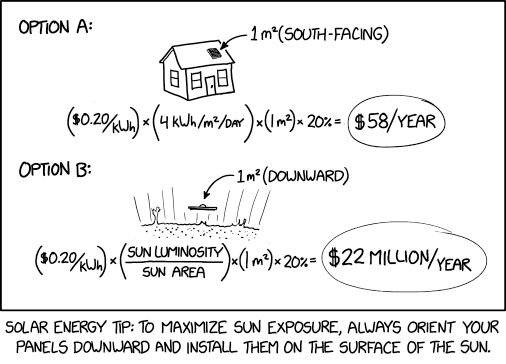- cross-posted to:
- xkcd@nom.mom
- science@beehaw.org
- cross-posted to:
- xkcd@nom.mom
- science@beehaw.org
OP, you should always include the title alt-text with an xkcd comic. Like so:
Getting the utility people to run transmission lines to Earth is expensive, but it will pay for itself in no time.
Sorry, my app displays that automatically for xkcd links, so I did not think of that
need a bot
So, a Dyson sphere
Seems legit.
the only issue there is is you have to install the panel during night, it is quite hot there during the day.
You could also wait for an eclipse.
Who are you, who are so wise in the ways of science.
I guess connecting the panels to the net is an issue for Infra?
They could send the energy wirelessly in the form of light beams, then use special panels to transform those beams of light on Earth. Let’s call them “solar panels”.
That number didn’t really seem enough to me. However, the solar luminosity is about 3.8×10^26 watts and the surface area about 6.1×10^18 m2, ie. 62.3 MW / m2. 8760 hours in a year times 62300 kW equals 545 million kW/h, at twenty percent efficiency times twenty cents each is $21.8 M/a.
The sun might seem to be really, really hot; but in fact, it is just quite hot and really, really big.
Xkcd always does the math.
The corona is around 1 million °C. That’s really really hot
The corona is indeed super hot, but also quite tenuous in comparison to the rest of the sun. The photosphere is only about 5500 °C. If our solar panels were made of diamond they would have melted at 3500, but it’s not impossible to imagine a solar panel that could be positioned ‘quite’ close to the sun’s surface - would just need to be made from some quite fancy materials.
Installing a solar panel on the sun is easier said than done. The closest real example is probably the Parker Solar Probe: https://www.youtube.com/watch?v=pOZhPz92Dic

it really sucks having direct links instead of images on mobile
Connect app shows this as an image
Same on Infinity.









